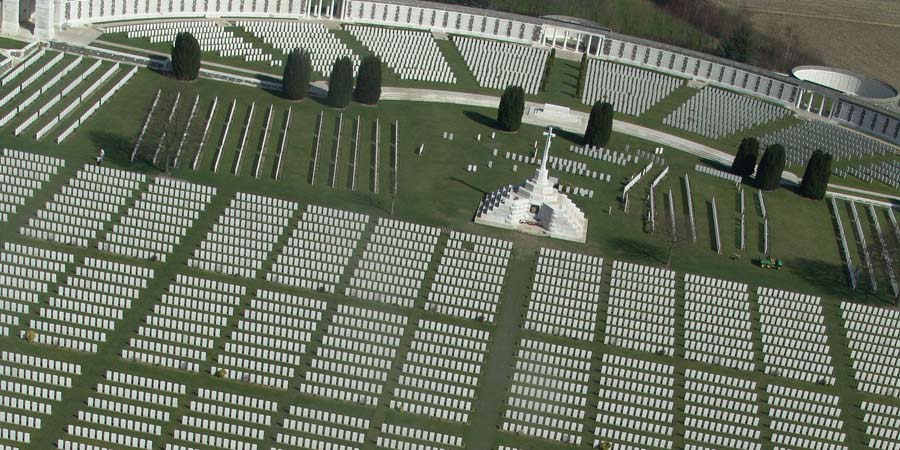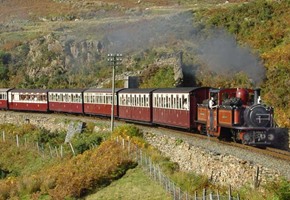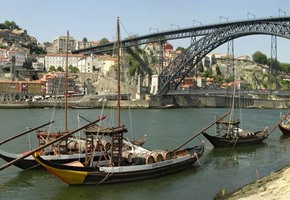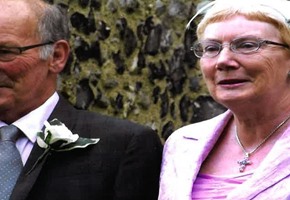On Monday 4th August 2014 precisely one hundred years will have
passed since Britain declared military action against Germany
following a period of sustained political unrest in Europe,
escalating a conflict which would alter the course of world
history.
In October 1914, just two months after battle lines had been drawn,
the unprecedented scale of the hostilities that had erupted across
Europe, initially provoked by the assassination by Serbian
nationalists of Archduke Franz Ferdinand, heir to the
Austria-Hungarian throne, prompted Canadian Journal Maclean's
Magazine to comment
"Some wars name themselves. This is the Great War."
August 4th 2014 marks the beginning of a four-year programme of events in the UK and worldwide to coincide with the four-year duration of the Great War and to commemorate its centenary with national acts of remembrance and cultural and educational initiatives.
How the Great War began: an overview

By the beginning of the twentieth century the international
balance of power between European states that had been formulated
and agreed at the Congress of Vienna in September 1814 was becoming
unstable at the hands of rising Imperialist and Nationalist
tensions.
In South Eastern Europe the Balkan states, no longer under the
control of the declining Ottoman Empire, were particularly volatile
and subject to the attentions of two competing powers: Russia and
the Austria-Hungary Empire. Austria-Hungary, sensing the need to
demonstrate its importance as a European power, proclaimed the
annexation of the Balkan country of Bosnia-Herzegovina in 1908.
This move outraged the independent Balkan nation of Serbia which
had formerly regarded Bosnia as part of its homeland and now
regarded the Austria-Hungary Empire as its enemy.
As the Austria-Hungarian Empire, close allies with Germany, made
this power-play in the Balkans, Russia formed an allegiance with
France - a country that had itself been subject the annexation of
its territory by Germany in 1870-71 - and with England. These,
along with existing political allegiances between European powers
and the rest of the world, practically guaranteed that any ensuing
conflict would have global implications.
One fateful incident triggered an unstoppable chain of events that
caused simmering tensions to boil over into war. Archduke Franz
Ferdinand, heir to the Austrian-Hungary throne and a personal
friend of Germany's Kaiser (ruler) Wilhelm II, travelled with his
wife to Sarajevo, the capital city of Bosnia-Herzegovina, on June
28 1914 in order to inspect the troops he had stationed there. Both
Ferdinand and his wife were shot dead, assassinated by a 19 year
old Bosnian-Serb nationalist named Gavrilo Princip who was
affiliated to a terrorist organisation known as the Black
Hand.
Seeking retaliation against Serbia but fearful of Russia's response
to any act directed against its ally, Austria-Hungary sought
Germany's commitment to provide support. Germany agreed and
Austria-Hungary issued Serbia with an ultimatum: it must eliminate
all terrorist activity and anti-Austrian propaganda within its
borders and submit to a full investigation into the assassination
of Archduke Ferdinand or face military intervention.
Serbia's response was to enlist the help of its ally Russia, which
mobilised its army. As a consequence Austria-Hungary declared war
on Serbia. Germany declared war on Russia, and began hostilities by
attacking France (after marching through neutral Belgium). In
support of their ally, France, on August 4th 1914 Great Britain
officially declared war on Germany and entered a bloody and brutal
conflict that would last more than four years, devastate much of
Europe, result in the loss of life and injury on an unprecedented
scale and change the course of world history forever.
The Western Front and the Battlefields of Europe

The First World War was fought on two fronts; the Eastern Front,
which took in the battlefields of Poland, Galicia in Spin and
Serbia where the Russian armies fought Austria-Hungarian and German
troops, and the Western Front. Considered the more significant
theatre of War, fighting on the Western Front was almost ceaseless
from the moment war was declared in August 1914 until its end on
the 11 November 1918.
A defensive line, entrenched on both sides and around four hundred
and forty miles in length, the Western Front ran from Belgium's
west coast through Ypres and on from Belgian Flanders into French
Flanders, through the departments of Artois, Picardy, Champagne,
Lorraine and Alsace ending at France's border with
Switzerland.
The battlefields of the Western Front have become synonymous with
the brutality of warfare; at Ypres, Flanders, the Somme and Verdun
some of the Great War's longest and bloodiest battles took place.
British forces, alongside allied troops from Belgium, France,
Australia, Canada, India, New Zealand, Newfoundland, South Africa,
Portugal and the United States of America took on the might of the
Imperial German Army in often inhumane conditions of mud, smoke,
foul weather, ceaseless explosions, cold and hunger.
Advances in military and weapons technology in the four decades
since the previous significant war meant that, for the first time,
soldiers in the Great War were pitted against machine guns,
fragmentation shells and long-range artillery, flame throwers and
toxic gas attacks. Both sides sustained fatalities and injuries on
a scale almost incomprehensible in its enormity: on the first day
of the Battle of the Somme, July 1st 1916, 19,240 British soldiers
were killed and a further 38,230 were injured.
The Battle of the Somme lasted, in total, for 141 days.
Towns close to the Western Front battlefields of Belgium and France
were often occupied by German or Allied troops and became heavily
defended 'fortress towns', used for strategic planning,
hospitalising the wounded and receiving military supplies. Such
towns would naturally become targets for enemy bombardment.
Consequently historic towns and villages in France and Belgium such
as Ypres, Arras, Reims, Peronne and many others were almost
entirely destroyed during the Great War, to be painstakingly
rebuilt and restored in peacetime.
Today, many of the battlefields, towns and villages of the Western
Front can be visited. Great Rail Journeys battlefield
tours visit some of the most educational and
emotionally-stirring destinations associated with the First World
War. Some are home to poignant War memorials and cemeteries
dedicated to specific countries which lost men in the Great War.
Others, such as the Lochnagar Crater in the Somme, France have been
preserved as they were when the war ended. Others feature
atmospheric 'living' museums that recount the story of the First
World War whilst attempting to accurately recreate the sights,
sounds, living conditions and experiences that those who fought in
the war would have encountered on a daily basis.
The Great War in Statistics
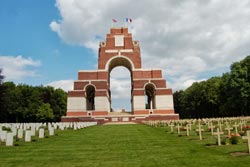
When the First World War is described as the Great War it seems
more likely that this connotation of 'great' was in reference to
the sheer scale of the conflict rather than a suggestion that the
war was in any way a commendable or glorious endeavour.
The numbers of lives lost and injuries sustained both by servicemen
and civilians during the first World War could certainly be
regarded as 'great' in terms of their size, but as with any
historical event of this duration and complexity, many fascinating
statistics can be attributed to the great war, including the
following:
- Average daily advance made by British troops at the Battle of Passchendaele: 204 feet
- Estimation of British troops wounded or killed at the Battle of Passchendaele: 244,897
- Estimated number of soldiers (both sides) exposed to poisonous gases: 1,200,000
- Soldiers killed (both sides) as a result of poisonous gas inhalation: 92,000
- Number of carrier pigeons relaying messages from HQ to the front lines: 500,000
- Total lives lost, military and civilian, both sides, in the Great War: 16.5 million
- Total number wounded, military and civilian, both sides: 19.5 million
- Number of British soldiers requiring full or partial limb amputation: 250,000
- Estimated number of shells fired (both sides) between 1914 and 1918: 1.45 billion
- Ypres inhabitants killed or wounded by unexploded munitions since 1918: 893
- Number of Victoria Crosses, the highest military honour, awarded: 634
- Number of countries drawn into the Great War: 30
- Number of Russian soldiers mobilised between 1914 and 1918: approx. 12 Million
- Number of Russian soldiers killed/wounded/missing in action: approx. 9 million
- Number of cases of 'shell-shock' treated by the British Army by 1918: 80,000
- Money received by Royal British Legion's first 'Poppy Appeal' (1921): £106,000
- Value of 1921 Poppy Appeal's £106,000 if raised today: around £4.4 million
Why should we commemorate the anniversary of the Great War?
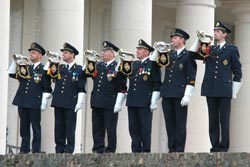
The novelist L.P. Hartley famously wrote "The past is a foreign
country: they do things differently there".
For today's generation, the period between 1914 and 1918 must seem
like a very foreign country indeed. Whilst we might learn about the
Great War in school history lessons and television documentaries,
scarcely anyone who took part in the great and bloody campaigns at
the Somme or Ypres is still alive to tell their story.
Why then, is it even necessary to remember something - and
something so unpalatable - that happened one hundred years ago, let
alone commemorate it?
To give the enormity of the Great War some context, consider this.
The population of the United Kingdom in 2013, according to the
Office of National Statistics, is roughly 64 million people. The
Great War claimed the lives of 16 million people. That's a quarter
of the UK's current population: killed in the space of just four
years between 1914 and 1918.
Add to that figure the 20 million people wounded. Now we're
considering a looking at a sum greater than half of the UK's
current population that were directly and adversely harmed by the
Great War. Stop to consider the indirect effect upon families of
those killed or injured in the Great War. Consider the wives who
lost husbands; mothers and fathers who lost sons; children who lost
brothers; families that were irreparably damaged as a consequence
of World War I.
When we commemorate the centenary of the Great War, what we're
actually doing is remembering the sacrifices - and often the
ultimate sacrifice - that ordinary men made in going to war to
fight for the freedoms and privileges that today we so often take
for granted.
We're thanking those, from all around the world, who stood side by
side to defend our futures often in the most inhumane
conditions.
Every year since the Great War ended, two minutes silence has been
observed at 11am on the 11th of November: the date and time at
which the Great War officially ended.
It is called 'Remembrance Sunday'.
We remember the fallen of not one but two world wars. Why do we do
this? To answer that you only have to ask yourself whether you
would have the courage to give your own life to save the future
lives of others. The men and women that died in those wars did
exactly that.
We owe it to them to remember them, and to commemorate not only the
soldiers that fought for our safety and freedom one hundred years
ago, but also for those who continue to fight for our freedom and
safety today.
Perhaps the greatest reason of all to remember and commemorate the
darkest times in our history is so that we can educate future
generations, helping them to understand the causes, learn from past
mistakes and help to ensure that conflicts with as devastating a
human cost as the Great War are remembered but never repeated.
How will the Great War be commemorated between 2014 and 2018?
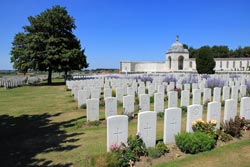
In the UK, a fund of £50 million has been committed to
commemorating the centenary of the Great War.
A programme of national events spanning the four-year commemoration
will begin with a special service in Glasgow Cathedral followed by
a wreath-laying ceremony at Glasgow's cenotaph for Commonwealth
leaders.
Glasgow is to host the Commonwealth Games in 2014 and the World War
I centenary commemoration commences the day after closing ceremony
of the games on Sunday 3rd August 2014.
There will also be a commemorative event taking place at the Saint
Symphorien Military Cemetery in Mons, Belgium; the site at which
both the first and the last Commonwealth casualty of the Great War
are said to be buried.
At Westminster Abbey in London, a candlelit service of prayer and
penitence will end at 11pm on August 4th to coincide with the
moment at which Britain's declaration of war with Germany was
issued.
Following the extensive refurbishment of the First World War
Galleries of London's Imperial War Museum, these will be reopened
as part of the commemoration.
Subsequent initiatives taking place across Britain in the four
years from 2014-2018 will include the laying of special paving
stones dedicated to those awarded the highest military honour for
valour 'in the face of the enemy' during the First World War and
the provision of support to local communities for the restoration
of Great War memorials.
The Royal British Legion will be promoting a scheme to plant
millions of Flanders Poppies - the flower historically associated
with the remembrance of those lost in World War I - across the
United Kingdom.
Museums throughout Great Britain will be hosting special
exhibitions dedicated to recounting and exploring every aspect of
the Great War covering aspects as diverse as the delivery of
call-up papers to the vital role that women played during the
conflict.
As part of an education initiative, two pupils from every state
funded secondary school in England will participated in battlefield
tours of the the Great War's historic Western Front from spring
2014 to March 2019.
The list of national and regional events to commemorate the
centenary of the Great War continues to grow daily. Comprehensive
and regularly updated information regarding nationwide and local
commemorations taking place between 2014 and 2018 can be found
at:
In Europe, similar programmes of national ceremonies, events and
services will take place between 2014 and 2018 to commemorate the
Great War's centenary. The official website detailing Belgium's
programme of commemoration is:
http://www.be14-18.be/en/events/agenda-national
The Government of France has committed to producing a programme of
commemoration "organized around six great national and
international events. This programme will emphasize passing on the
memory of the Great War [to young people], cultural and scientific
development, and remembrance tourism". More information regarding
France's Great War commemoration events can be found here:
http://centenaire.org/en/en-france
To discover how the centenary of the Great War will be commemorated
by other countries that were involved around the world, information
can be found at:
The Great War and Centenary News
__________________________________________________
The outbreak of the First World War at 11pm on August 14th 1914 was a watershed in British, European and world history which affected lives on a global scale. The centenary of this tumultuous and catastrophic event is not a case for celebration but heralds a four-year period in which to better remember, reflect upon, understand and learn from the Great War, to thank and honour those who fought in it and to salute the men and women both in Britain and around the world who continue daily to make sacrifices in order to protect us and safeguard the freedoms and privileges we value.
Click here to view Great Rail Journeys' Battlefield Tours

